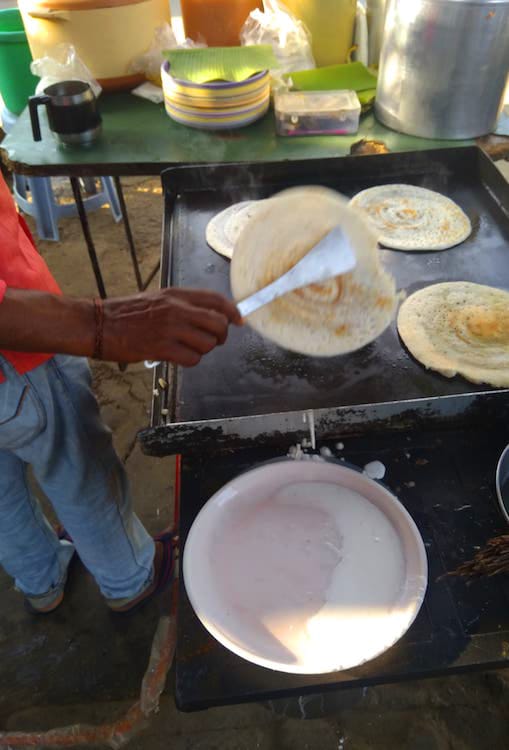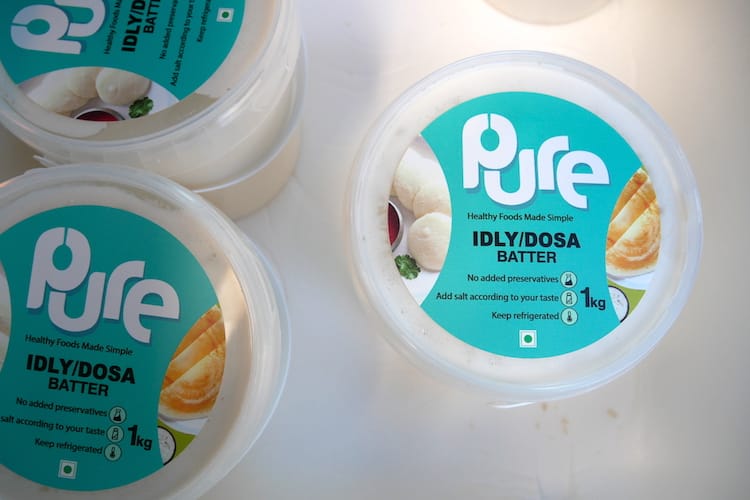What’s the best way to tell area residents about plans for a new asylum shelter nearby?
The government should tell communities directly about plans for new asylum shelters, some activists and politicians say.
“Batter man or something. I don’t know what they call me.”

Santhosh Sankaranarayanan hit the road Saturday with 60kg of batter in the boot.
Was the IT consultant ever worried what others might think of his side gig making and delivering dosa mix? At one point, he says. Now, not so much. He’s been doing this for roughly six months.
His right hand rests on the steering wheel. Traffic on Cuffe Street is bumper to bumper.
“At least, many people know me,” he says, cheery and bright. “Batter man or something. I don’t know what they call me.”
Wedged by his seat is a clipboard and address list. Piled in the back are white polystyrene boxes, packed with small buckets of batter for dosas – crispy and sour south Indian pancakes.
“Ah yes!” says Sankaranarayanan, as he spots his next drop-off point.
He crawls up on the pavement near the fork of South Richmond Street. He taps at his phone and a male voice answers.
“Can you come? Quickly, please. The same location,” Sankaranarayanan says.
Sankaranarayanan has always had ideas, he says. “Crazy ideas.”
A machine to make sambar, a South Indian stew. A printer that would wipe paper clean and use it again. “But these have all happened,” he says.
For 20 years, he stuck with his job in IT. “There was a fear factor involved. How do I start something?”
He and his wife Srikripa moved from Derry to Lucan early last year. They wanted a change of scenery. Something new.
A paperwork glitch meant he was at home for two weeks. He was already looking for a change. It gave him a nudge.
“Food was a bit of an attraction to me,” he says. He had searched here for dosas but couldn’t find them. “So, I thought, okay, there’s a little gap.”

Dosa batter is simple too – a mix of rice, urad daal, fenugreek and water. Grind it, mix it, ferment it. He and his wife were masters at that.
In mid-March this year, he set up a WhatsApp group. He invited 15 people. It now has 240 customers. Some put in orders every week. Others less often.
He still does IT contract work, he says. Database administrator by week day. Hawker of dosa batter by Wednesday evenings and Saturday mornings.
Last orders for Saturdays are due by 6:30am Friday morning. Some trickle in later, and he might manage to squeeze in a few, he says.
Friday evenings, he and Srikripa make up the mixture.
Last Saturday, Sankaranarayanan had been up at 5:30am, wolfing down breakfast – a dosa, of course – before packing up the car to head out on deliveries.
“I’m at the gate,” he says, on speaker phone, as he pulls up to a complex off Orwell Road in Rathgar. It’s about 11am.
A guy in a blue T-shirt waits in his doorway. The complex is quiet.
“How was last week’s badminton?” says Sankaranarayanan. He pops open the boot. He pulls out a small bucket.
“It was an adventure for me actually. I had to rent a car,” says his customer.
Knocking on a stranger’s door the first time was odd, says Sankaranarayanan, as he pulls out of the complex, and back onto Orwell Road.
“It was really hard for me. The profession is totally different,” he says.
After two deliveries though, the feeling faded. “I was thinking, why worry about this? I choose to do this,” he says.
Many of his customers work in IT, others in banks.
Some are from north India, he says, but have lived in Bangalore, where they picked up a taste for the steamed cakes called idly and fried dosas stuffed with spiced potatoes or smothered with chutneys.
But they never learn to make the batter. “That’s an advantage for me,” he says. “They are missing it here.”
South Indians order too, though, he says. Keralites who are too busy to cook or who struggle to ferment the mixture in Ireland’s colder climate. “This is quick and easy,” he says. “But still cooking in your own kitchen.”
Sankaranarayanan grew up in Kerala about 25km from Cochin, towards the hill station of Munnar with its green landscape and tea plantations. “It’s kind of a village,” he says.
His father died when he was 16 years old. His mother was a housewife. He has three brothers and one sister. They had plantation land. “The money crop was rubber,” he says. There was rice in paddy fields and coconut trees all around.
He has lived away from there much of his life, though. First in Chennai, and later in Delhi, Halifax, Donegal, and Derry.
Dublin is still new to him. He sometimes gets lost if Google Maps fails him. His phone led him to the middle of the M50 this morning. The route stopped there. A taxi driver set him straight.
“I don’t know where I’m going basically,” he says, with a hearty laugh.
He points to the map on his phone. “I’m all dependent on this guy.”
“I see so many people running, and I’m driving,” says Sankaranarayanan, as he passes along Oscar Traynor Road. “I’m like … why?”
Outside the sky is blue. On large grass pitches, a group of boys in green and white stripes kick a football around.
A girl with a red ribbon in her hair watches, perched on a low wall. A woman in sunglasses trots after a small dog.
Before the day is done, Sankaranarayanan will have driven 120km. He toys with questions of what comes next.

Their batter-making has evolved already, he says. With a small traditional grinder, big batches were labourious. Churning out 20kg took five hours.
He and Srikripa sped it up with a machine shipped in from Gujarat. “It’s a table-top kind of thing,” he says.
They have an even bigger mixer with an even bigger motor. But he can’t run that from a normal power socket. So he is looking for another space, a shared kitchen perhaps, to grow even more.
But they’ve questions to work out. How to drop the plastic packaging. If he gets it in shops – where shelf space is money – pouches or tetrapak might be better than buckets, he says. “They won’t take too much space.”
He wonders how to appeal to more people. By stressing the healthy side of dosas and idly, perhaps. That they’re gluten free and such.
People are asking for chutneys, too, and more varieties of batter. Or the spongey rava idly made with semolina, or vadas, the small fried doughnuts. “That’s a popular south Indian snack,” he says.
He crawls up Greencastle Road, past the high fences either side of the road and the industrial warehouses, and past the giant grey Bargaintown.
“Just for 1kg, I am driving this much, you know,” he says. He shakes his head and cracks up.
The phone starts to ring. One woman is running late. She wants to rearrange a drop-off.
Another is hungry and asks where he is. “We have not yet had breakfast,” she says, on the speaker phone. “We are waiting for dosas.”
Get our latest headlines in one of them, and recommendations for things to do in Dublin in the other.